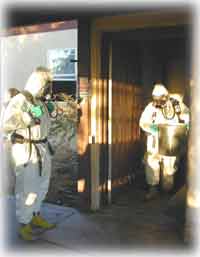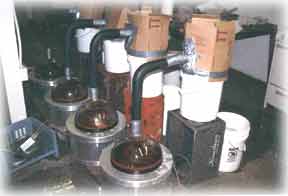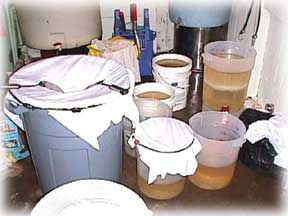|
Bureau of Narcotic Enforcement
CLAN LAB PROGRAMS
Clandestine Laboratory Enforcement Program (CLEP)
Through the Clandestine Laboratory Enforcement Program, the Bureau of Narcotic Enforcement investigates and shuts down illegal drug-making operations across the state. Each of BNE's nine regional offices has at least one clandestine drug laboratory team.
A vast majority of the clandestine labs are found producing methamphetamine, a powerful stimulant whose abuse has been creeping into all segments of society and across a broader range of ages. "Clan labs" may also produce such illegal drugs as LSD and synthetic heroin. While a growing number of clan labs are sprouting in the Midwest and Southeast, California continues to produce more meth than any other region.
 The ease by which meth can be made from many commonly found household products like ammonia, using formulas that do not require trained chemist, can be vexing in the battle against illegal drug making. In a countermove, BNE operates a state Precursor Compliance Program to closely monitor the use of meth-making products such as reagents, solvents, laboratory glass flasks and precursor chemicals that are needed for clan lab operations. The program tracks chemicals shipped into California that are likely to be bought by illegal drug makers and holds businesses accountable for diversions of precursor chemicals to illegal drug labs. Undercover operations have been used to halt the unrestricted sale of over-the-counter drugs containing pseudoephedrine compounds that can be used for meth production. The ease by which meth can be made from many commonly found household products like ammonia, using formulas that do not require trained chemist, can be vexing in the battle against illegal drug making. In a countermove, BNE operates a state Precursor Compliance Program to closely monitor the use of meth-making products such as reagents, solvents, laboratory glass flasks and precursor chemicals that are needed for clan lab operations. The program tracks chemicals shipped into California that are likely to be bought by illegal drug makers and holds businesses accountable for diversions of precursor chemicals to illegal drug labs. Undercover operations have been used to halt the unrestricted sale of over-the-counter drugs containing pseudoephedrine compounds that can be used for meth production.
Clan labs not only pose a public safety hazard from illegal drug use, they can quickly create chemical cesspools given the highly flammable, toxic and explosive materials used. Some 15 percent of clan labs expose themselves through explosions or fire when volatile chemicals are mixed in poorly ventilated rooms. While often found in rural areas, clan labs are turning up in big city apartments, mini storage units and even motel rooms. See the Attorney General's Brochure on Clandestine Drug Labs.
Concerned about public safety, BNE has been a leader in developing standardized training for law enforcement officers who investigate and dismantle clan labs. The training, by necessity, covers firefighting, chemistry, bomb-handling techniques and hazardous waste disposal. The training also involves recertification and annual health testing. The requirements meet Occupational and Safety Health Administration regulations for the safe processing of clandestine laboratories. BNE also follows the state Drug Endangered Children protocol when discovering children under dangerous, neglected and abusive living conditions. Children found at clandestine laboratory sites are provided additional medical and social services unique to that type of abuse and neglect.
California Methamphetamine Strategy Program (CALMS)
 In 1998, the Bureau of Narcotic Enforcement developed the California Methamphetamine Strategy (CALMS) for a comprehensive attack on methamphetamine production and distribution in the state. BNE was the first agency in the nation to develop a statewide methamphetamine strategy. In 1998, the Bureau of Narcotic Enforcement developed the California Methamphetamine Strategy (CALMS) for a comprehensive attack on methamphetamine production and distribution in the state. BNE was the first agency in the nation to develop a statewide methamphetamine strategy.
CALMS is divided into five components: law enforcement, intelligence, forensics, training and safety and crime prevention and education. BNE has assigned one experienced special agent to each of its nine regional offices who is designated as a prevention/education officer to work with schools, community organizations, nonprofit groups and government agencies to educate the public about the dangers of methamphetamine.
Since its inception, CALMS teams have conducted over 1,900 investigations, made nearly 2,400 arrests and seized over 27,000 pounds of methamphetamine. In 2002, BNE seized 768 methamphetamine laboratories. In 2002, over 300 children were found and removed from homes containing meth clan labs.
Significant Clan Lab Cases [PDF 71KB/2 Pg]
Precursor Compliance Program
The Precursor Compliance Program (PCP) is the regulatory and enforcement support program working in conjunction with the Clandestine Lab Enforcement Program (CLEP). The program operates from BNE headquarters and acts as the state regulatory authority over businesses providing or receiving controlled chemical substances, laboratory apparatus, reagents and solvents. The program currently controls 35 controlled chemical substances. The program also provides case assistance and case leads to all law enforcement agencies.
Significant Precursor Compliance Cases [PDF 44KB/1 Pg]
California Health and Safety Code Regulation and Control [PDF 123KB/15 Pg]
FORMS
Report of Sale or Transfer of Controlled Chemical
Substances within California - BNE 012 [PDF 143KB/3 Pg]
Report of Receipt of a Controlled Chemical Substance
from an Out-Of-State Source - BNE 034 [PDF 145KB/3 Pg]
Clandestine Laboratory Programs (916) 227-3985
Precursor Compliance Program (916) 227-3955
4949 Broadway
Sacramento, CA 95820
|

